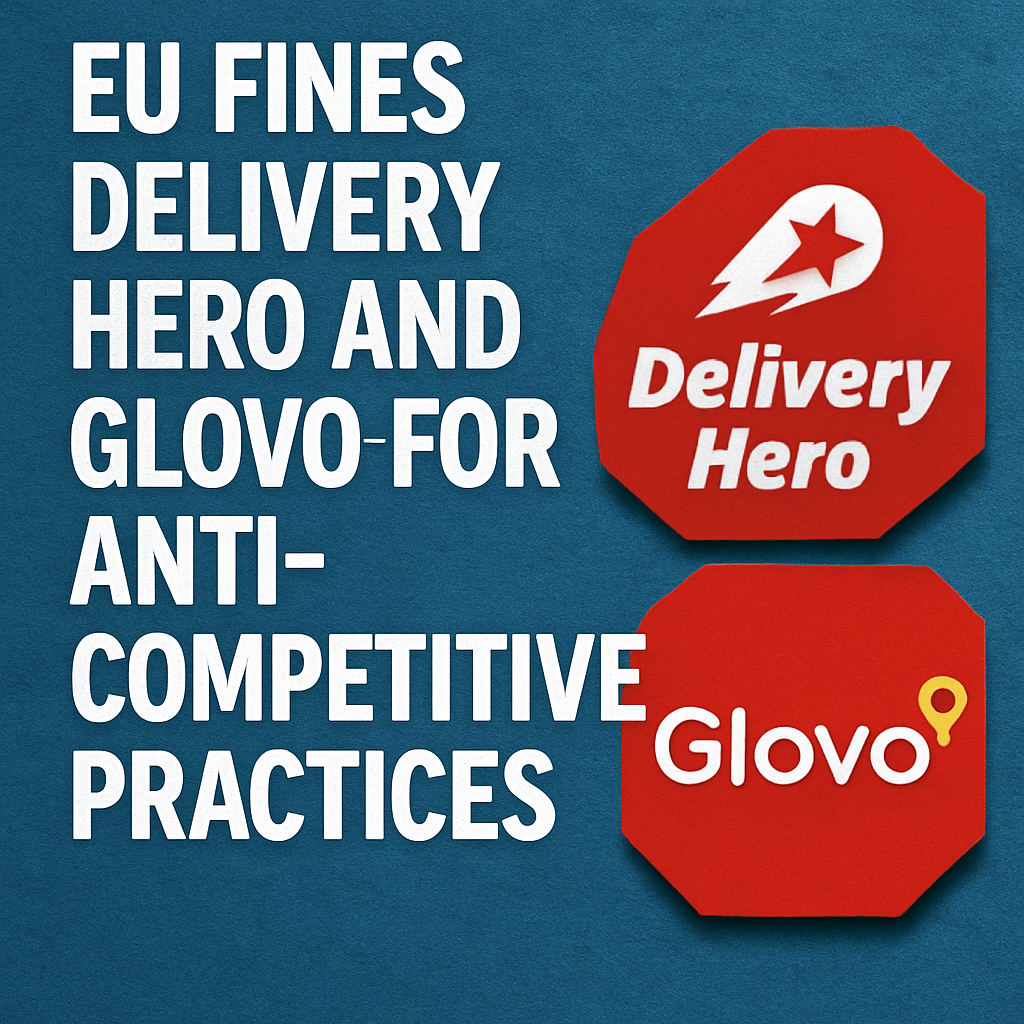EU Fines Delivery Hero and Glovo for Anti-Competitive Practices

The European Commission has concluded a comprehensive investigation into anti-competitive agreements between Delivery Hero, a leading food delivery service based in Germany, and Glovo, headquartered in Spain. As a result of their collaboration in a cartel that manipulated the online ordering and delivery of food, groceries, and other daily consumer goods, both companies have been imposed a total fine of €329 million.
Findings of the Investigation
The investigation drew attention to several violations of EU competition rules, particularly in the context of market share manipulation and labor market agreements. This case represents a significant landmark in European antitrust law as it is the first instance where the EU has penalized the anti-competitive exploitation of minority shareholdings. The Commission highlighted how minor stakes in a competitor’s business could be leveraged to reduce competition.
“Of course, owning a stake in a competitor is not illegal. But it may be problematic when that stake is used to gain inside information and influence decisions in ways that can harm competition,” stated Teresa Ribera, the Commission’s Executive Vice President in charge of competition.
First Case Investigating Labor Market Collusion
In addition to standard competition regulations, this investigation marks the inaugural case of EU antitrust enforcement that scrutinizes labor markets. The Commission found evidence that Delivery Hero and Glovo engaged in mutual agreements not to hire or poach each other’s employees. As indicated by the Commission, such practices indirectly limit job opportunities for individuals looking to enter the labor market.
“This investigation shows that competition rules aren’t just about keeping prices down,” reiterated Ribera, emphasizing that EU antitrust regulations also aim to sustain “a fair labor market where employers compete for talent and do not collude to limit the number and quality of opportunities for workers.”
Background of the Companies’ Relationship
The partnership between Delivery Hero and Glovo began in July 2018 when Delivery Hero acquired a minority stake in Glovo, progressively increasing its share over the following years. The EU’s scrutiny intensified in June 2022 and again in November 2023, when officials conducted surprise inspections at both companies as part of a self-initiated inquiry into the potential collusion in the food delivery sector.
Ultimately, by 2022, Delivery Hero achieved sole control over Glovo, which subsequently became a subsidiary, thereby formalizing their previously understood arrangements into a more direct corporate relationship.
Details on the Cartel Behavior
The Commission concluded that from July 2018 to July 2022, the two companies systematically dismantled competitive constraints and replaced them with anti-competitive strategies that severely hindered rivalry. They undertook covert discussions that covered sensitive competitive information beyond what would typically be relevant for an investor seeking to ensure the viability of its financial interests.
- Information Exchanges: The companies discussed crucial topics including
- Commercial strategies
- Pricing structures
- Capacity management
- Costs associated with operations
- Distribution network organization for riders
“They discussed virtually everything. And of course, this could only lead them to potentially align their content in the market,” noted a senior government official.
Market Division and Employee Agreements
A critical element of the companies’ infringement was the geographical division of markets. Glovo and Delivery Hero refrained from entering each other’s national markets while consciously coordinating market entries in regions where neither had an established presence. This effectively eradicated direct competition in numerous geographic areas.
The companies also engaged in what are termed ‘no-poach’ agreements, which significantly limited direct competition for labor. By refraining from hiring each other’s staff, they restricted potential employment opportunities and wages for workers.
“In other words, companies stop directly competing for workers. This is not good for workers, as it suppresses wages and reduces labor mobility,” explained Ribera.
Future Outlook for Minority Shareholding Regulations
Looking ahead, Ribera indicated that the Commission intends to strengthen its scrutiny on competitive risks emerging from minority shareholder arrangements. She expressed qualified support for the practice, indicating it could foster investment but underscored the importance of preventing access to proprietary information that might undermine competition.
“It is reasonable for a shareholder to access pertinent information to safeguard investment decisions, but misuse of sensitive data that may inhibit competition will not be tolerated,” Ribera affirmed, indicating the EU’s vigilance in monitoring similar activities across various industries.
Conclusion
The implications of this case extend beyond financial penalties for Delivery Hero and Glovo. It sends a clear message regarding the EU’s commitment to enforcing competition laws, especially in sectors like food delivery and labor markets. As the landscape of digital and physical marketplaces continues to evolve, regulatory bodies are adapting their frameworks to safeguard competition and ultimately protect consumer and employee interests.
Source: euronews